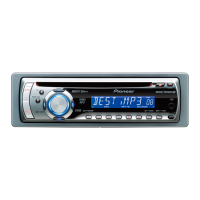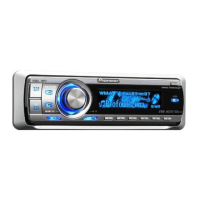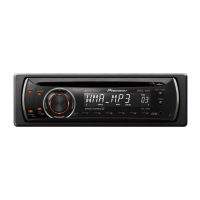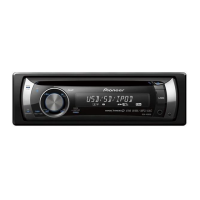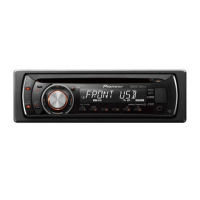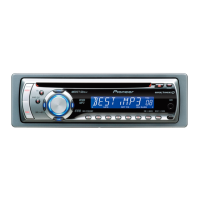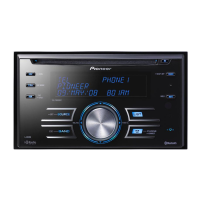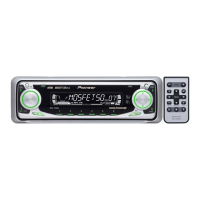
Do you have a question about the Pioneer Super Tuner III D DEH-P8950BT and is the answer not in the manual?
| Brand | Pioneer |
|---|---|
| Model | Super Tuner III D DEH-P8950BT |
| Category | Car Receiver |
| Language | English |
Information about the unit's general features, warnings, and legal notices regarding audio formats like WMA, MP3, AAC, and Bluetooth technology.
Provides the URL for the Pioneer website to find more information about the corporation and its products.
Explains how to detach the front panel to deter theft and details the warning tone and face auto open features.
Instructions on how to install the battery in the remote control and general precautions for its use.
Details compatibility with iPod devices, including supported models and software versions, and potential operational variations.
Step-by-step guide on how to safely remove the detachable front panel from the head unit.
Instructions on how to reattach the front panel to the head unit after removal.
Explains when and how to reset the unit's microprocessor, typically for troubleshooting or initial setup.
Describes the unit's two demonstration modes: reverse mode and feature demo mode.
Provides guidance on how to operate the remote control, including important handling precautions.
An overview identifying and explaining the functions of the head unit and remote control buttons.
Covers fundamental operations such as turning the unit on/off and selecting audio sources.
Instructions on how to adjust the sound level using the MULTI-CONTROL.
Basic operations for the tuner, including selecting bands, manual tuning, and seek tuning.
Guide on how to store and recall up to six broadcast frequencies for easy access.
Explains how to access the main menu for advanced functions related to the tuner.
Details on using Best Stations Memory (BSM) to automatically store the six strongest broadcast frequencies.
Instructions for using local seek tuning to tune into radio stations with sufficiently strong signals.
Basic operations for the CD player, including inserting discs and playing audio CDs or compressed audio files.
How to directly select a desired track by entering its number, applicable for both CD and USB playback.
Overview of advanced functions for the CD player, accessible via the main menu.
Explains how to set repeat play ranges like Track, Folder, or Disc repeat for various playback modes.
Guide on how to play tracks in a random order using Shuffle Songs or Shuffle Albums.
How to use Scan mode to play the first 10 seconds of each track or file within a selected range.
Instructions on how to pause and resume playback of a CD or compressed audio disc.
How to use COMP and BMX functions to adjust sound playback quality for better audio experience.
Details on using Rough Search to navigate through tracks in increments of ten.
Explains how to input and display CD titles for easier disc searching and management.
How to display text information such as artist name, track title, and album name from discs.
How to view and select tracks from a CD TEXT disc using the track title list.
How to view and select audio files or folders from a list based on their file names.
Basic operations for controlling and playing music from an iPod connected to the unit.
Guide on navigating and selecting songs from an iPod by category like playlists, artists, or albums.
How to view text information such as artist name, album name, and song title from the connected iPod.
Overview of advanced functions for iPod playback, accessible through the main menu.
How to set repeat play modes for iPod songs, choosing between repeating one song or all songs.
Instructions for playing iPod songs in a random sequence using Shuffle Songs or Shuffle Albums.
How to play all songs on the iPod in a completely random order.
How to pause and resume playback of a song from the iPod.
Option to adjust the playback speed for audiobooks to be faster, normal, or slower.
Basic operations for controlling a Bluetooth audio player, including connection and playback.
Steps required to establish a Bluetooth wireless connection between the unit and a Bluetooth audio player.
Overview of advanced functions for Bluetooth Audio, accessible via the main menu.
How to properly disconnect a Bluetooth audio player from the unit.
Automatically connects to the most recently used Bluetooth audio player when in range.
Instructions on how to start playback of songs from a connected Bluetooth audio player.
How to stop the playback of songs from the Bluetooth audio player.
How to pause and resume playback of a song from the Bluetooth audio player.
Enables automatic connection to the most recently connected Bluetooth audio player.
How to view the unit's Bluetooth Device (BD) name and address.
Basic operations for using the Bluetooth telephone function, including connecting and making calls.
Information on the telephone source standby mode and its implications for battery usage.
Steps to set up the unit for hands-free phoning, involving Bluetooth connection and phone registration.
Covers different methods for making phone calls, including dialing numbers, using the phone book, and presets.
How to make calls using voice commands, dependent on the cellular phone's voice recognition capabilities.
Instructions on how to answer or reject incoming calls, including call waiting functionality.
How to reject a call waiting without interrupting the current call, logging it in the missed call history.
Overview of advanced Bluetooth telephone functions, varying based on phone connection status.
Methods for establishing a Bluetooth wireless connection with a cellular phone.
How to search for and connect to available Bluetooth-enabled phones in the vicinity.
Guides on how to initiate a Bluetooth connection from the cellular phone to the unit.
Procedure for closing the Bluetooth wireless connection with a cellular phone.
How to register a temporarily connected phone to access full features and store up to three phones.
Instructions on how to remove a registered phone from the unit's memory.
How to establish a Bluetooth connection with a registered phone, either manually or automatically.
Steps to manually connect to a registered phone using the unit's connection menu.
Details on how the unit automatically connects to a registered phone when it comes into range.
Information on storing up to 650 names and numbers and transferring contacts from a registered phone.
Guide on how to find and call numbers from the Phone Book, including searching by letter.
How to assign categories (genres) like Home, Mobile, or Office to phone book entries for easier organization.
Instructions on how to edit the names of entries in the Phone Book, including character selection.
Guide on how to edit the phone numbers associated with entries in the Phone Book.
How to delete individual entries from the Phone Book.
Explanation of how to browse and call numbers from the Call History (missed, dialled, received calls).
Instructions on how to make a call directly from an entry in the Call History.
How to make international calls from the Call History, including adding the '+' prefix.
How to assign frequently used phone numbers to preset buttons for quick recall.
Step-by-step guide on how to dial a phone number directly using the unit's controls.
How to clear various types of stored data, including Phone Book, Call History, and preset numbers.
Configures the unit to automatically reject all incoming calls.
Configures the unit to automatically answer all incoming calls.
Allows selection of different ring tones for incoming calls or to turn the unit's ring tone off.
Improves sound quality during hands-free calls by reducing echo and background noise.
Shows the unique 48-bit device address for Bluetooth devices.
How to view the unit's own Bluetooth Device (BD) name and address.
Allows users to select different screen displays for incoming calls.
Covers various audio settings to customize sound output, including balance, equalizer, and subwoofer.
Overview of the audio adjustment menu, listing available functions like Fader, Equalizer, and Bass Boost.
How to adjust the front/rear and left/right speaker balance for optimal listening.
Explains how to use the equalizer to adjust sound characteristics and recall stored equalizer curves.
Guide on how to select and fine-tune equalizer curves, including factory presets and custom settings.
Detailed steps for adjusting the level of each frequency band in the 7-band graphic equalizer.
How to activate loudness control to compensate for low- and high-sound deficiencies at low volumes.
Instructions on turning the subwoofer output on/off and selecting its phase.
How to adjust the subwoofer's cut-off frequency and output level when the subwoofer is active.
How to use the Bass Boost function to enhance low-frequency sound levels.
Instructions on activating the high pass filter to control low frequencies output from front/rear speakers.
How to adjust the volume level of each audio source to prevent drastic changes when switching sources.
Guides users through customizing various system settings for optimal performance.
Overview of the process for accessing and adjusting various initial system settings.
Enables selection of the display language from multiple options.
Step-by-step guide to choosing the preferred language for the unit's display.
Instructions on how to set the calendar date, which is displayed when the telephone source is active.
Guide on how to set the unit's clock time, including automatic time synchronization.
Allows adjustment of the FM tuning step between 50 kHz and 100 kHz for seek tuning.
How to set the AM tuning step, especially for North, Central, or South America.
Option to turn on or off the warning tone that sounds when the front panel is not detached.
Enables or disables the automatic opening of the front panel for easier detachment.
Instructions on activating AUX sources (AUX1/AUX2) for connected auxiliary equipment.
Configures the display to dim automatically when the car's headlights are turned on.
How to adjust the brightness level of the unit's display.
Configures the rear output for full-range speakers or direct subwoofer connection.
Controls automatic sound muting or attenuation when signals from devices with mute functions are received.
Enables or disables the automatic feature demonstration mode that activates when the unit is off.
Activates or deactivates the reverse mode, which reverses screen indications after a period of inactivity.
Controls continuous scrolling of text information from CDs or iPods on the display.
Enables the Bluetooth Audio source, which is set to 'on' by default, for connecting audio players.
Guide on entering the PIN code required to verify Bluetooth connections with cellular phones.
Allows users to customize the device name displayed for Bluetooth connections.
How to display the system and Bluetooth module versions, useful when consulting for repairs.
Procedure to delete Bluetooth telephone and audio data to protect personal information before transferring the unit.
Covers miscellaneous functions including using AUX sources, setting AUX titles, clock display, and entertainment displays.
Instructions on connecting and using auxiliary equipment such as VCRs or portable devices via AUX inputs.
Explains the two methods for connecting auxiliary equipment using stereo mini plug or IP-BUS RCA interconnectors.
How to select the AUX input as the audio source, provided the auxiliary setting is turned on.
Allows users to change the displayed title for AUX1 or AUX2 sources.
Instructions on how to toggle the clock display on or off, which remains visible even when other sources are off.
How to enjoy various visual entertainment displays while listening to different sound sources.
Details on using the PGM button on the remote control to operate preprogrammed functions for various sources.
Basic operations for controlling a USB adapter and information on USB portable audio player/memory operations.
How to select an audio file directly within the current folder, similar to built-in CD player operations.
Overview of advanced functions for USB playback, accessible via the main menu.
How to view and select audio files or folders from a list based on their file names for USB playback.
How to display text information for audio files, mirroring the functionality for CDs.
Basic operations for controlling a multi-CD player, including disc and track selection.
How to directly select a track from the multi-CD player, similar to the built-in CD player.
Overview of advanced functions for multi-CD player playback, including Compression and ITS play modes.
Explains ITS (Instant Track Selection) for creating playlists of favorite tracks from the multi-CD player.
Step-by-step guide on how to enter and store favorite tracks into an ITS playlist.
How to play back tracks that have been programmed into your ITS playlist.
Instructions on how to delete individual tracks from the ITS playlist.
How to delete all tracks from a specific CD from the ITS playlist.
Information on inputting and displaying CD titles for easier searching and playback.
How to display text information for discs that have had a title entered.
How to view and select discs from a list based on their entered titles.
Explains the use of CD TEXT functions, which display text information embedded in compatible CDs.
Basic operations for controlling a DVD or multi-DVD player, including disc and chapter selection.
How to select a specific disc when using a multi-DVD player.
Instructions on how to select a folder when playing compressed audio from a compatible DVD player.
Overview of advanced functions for DVD playback, including play mode, random mode, and scan mode.
Basic operations for controlling a TV tuner, including band selection, manual tuning, and seek tuning.
Guide on storing and recalling up to 12 broadcast stations for easy access via presets.
How to use the remote control's preset tuning buttons (P.CH 1-6) to store and recall stations.
Instructions for using BSSM to automatically store the 12 strongest broadcast stations sequentially.
A table listing common symptoms, their causes, and suggested actions for resolving issues with the unit and connected devices.
Provides a list of error messages, their causes, and recommended actions for troubleshooting.
Provides guidelines for proper disc handling, including types of discs supported and precautions to prevent damage.
Information regarding Dual Discs (two-sided discs) and their compatibility or potential issues with the unit.
Details about compressed audio file formats (WMA, AAC, MP3, WAV) and their compatibility with the unit.
Specifies compatibility details for compressed audio formats like WMA, MP3, AAC, and WAV, including bit rates and sampling frequencies.
Illustrates a typical folder hierarchy for compressed audio files, showing folder and file structure.
Safety precautions and recommendations for handling the iPod while connected to the unit, especially regarding temperature and securing the device.
Notes on iPod settings like Equalizer and Repeat that may behave differently when controlled by the unit.
Technical specifications covering power source, grounding system, current consumption, dimensions, and weight.
Detailed audio specifications including maximum power output, continuous power output, load impedance, and equalizer settings.
Technical specifications for the FM tuner, including frequency range, usable sensitivity, and signal-to-noise ratio.
Technical specifications for the AM tuner, including frequency range and usable sensitivity.
Specifications related to the Bluetooth function, including version and output power.
Technical specifications for the infrared remote control, detailing its wavelength and output power.

